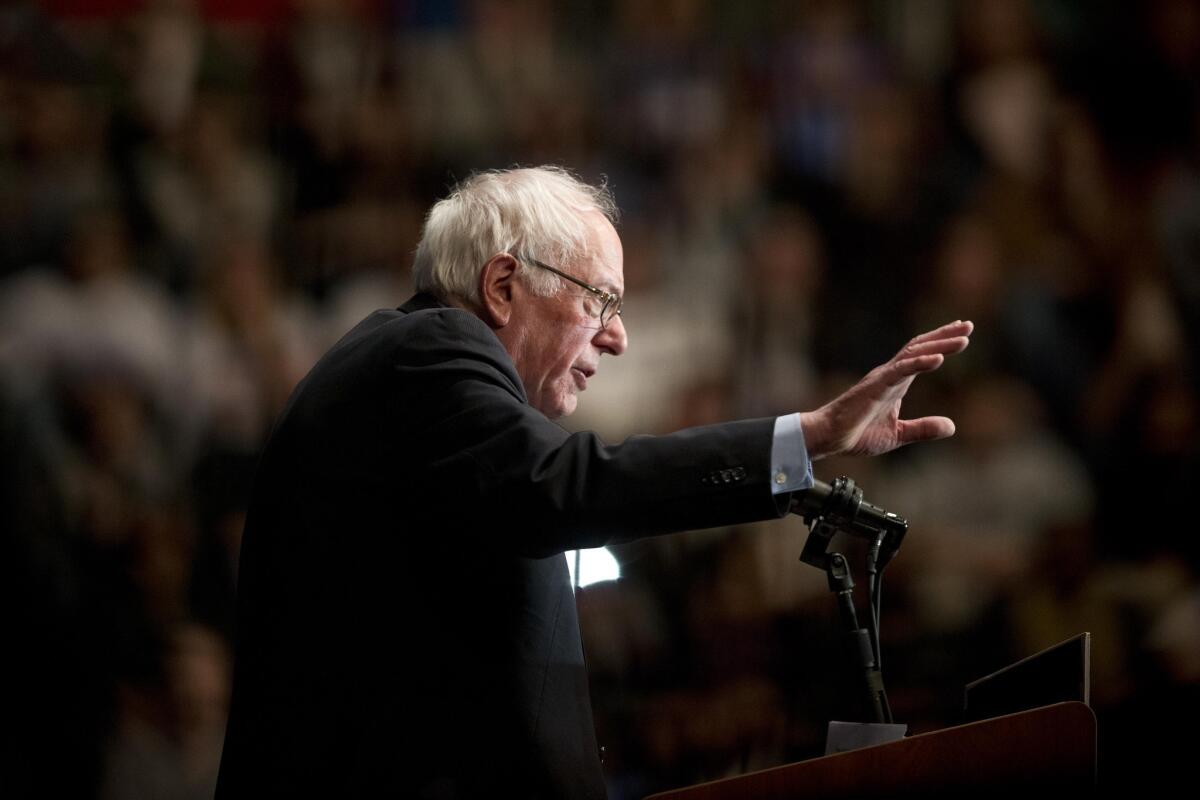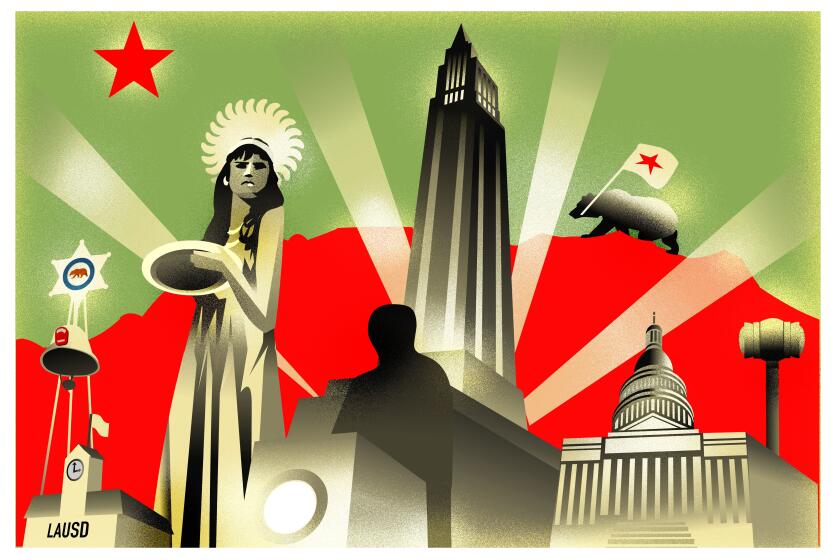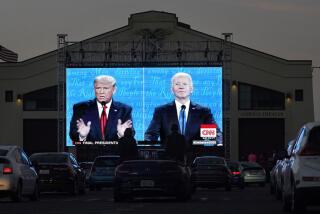Column: Bernie Sanders isn’t going to destroy the Democratic Party. He just might save it

- Share via
After Bernie Sanders led the popular vote in the Iowa caucuses, the emails started trickling in.
Alarmed Democrats, and excited Republicans, saw in Sanders a ghost that has loomed over the Democratic Party for decades: George McGovern.
McGovern, the 1972 Democratic presidential nominee, suffered a historic defeat that year. He lost every state, save Massachusetts. Richard Nixon was reelected in a landslide.
If the senator from Vermont becomes the Democrats’ nominee, my correspondents predict, the party will go down in flames. Trump will enjoy Nixonian reelection numbers, down-ballot Democrats will suffer needless losses and the party will have to rise from the ashes once again.
This, to quote South Carolina’s favorite Democratic hopeful, is a bunch of malarkey.
While Sanders and McGovern may be ideological brethren, a potential matchup between Sanders and Trump bears little resemblance to the matchup between McGovern and Nixon.
Here’s why:
During Nixon’s first term, the American economy was booming — economic growth was strong, personal income was up. His popularity was high — about 60%. While McGovern campaigned to end the Vietnam War, Nixon could boast that he had drastically drawn down the number of U.S. troops fighting what had become by then a deeply unpopular conflict. He courted Democrats by vowing to lower taxes for the working class.
McGovern made some consequential mistakes: He chose a running mate, Sen. Thomas Eagleton of Missouri, who would later be forced off the ticket after it was disclosed that he had been treated for depression with electroshock therapy. After vowing to support Eagleton “1,000%,” McGovern shoved him aside to make room for Peace Corps founder Sargent Shriver, a Kennedy in-law.
Conventional wisdom holds that McGovern was too far left, and that voters specifically rejected his ideology. They then used his defeat to craft self-serving narratives.
“What happened is that critics of progressive policies — whether economic or social or racial — picked the ones they were opposed to before McGovern, then pointed to them as the reason for his loss,” said the American political historian Joshua Mound, a postdoctoral fellow at the University of Virginia.
“In reality,” Mound says, when you add up Nixon’s positives, “any Democrat was doomed to lose.” I spoke to him on Friday morning after reading a 2016 essay he wrote for the New Republic: “What Democrats Still Don’t Get About George McGovern.” The Democratic Party, wrote Mound, “could have resurrected FDR, and Nixon would have trounced him in 1972.”
McGovern’s loss drove Democrats to the middle. The Clinton years of “triangulation” and moderation would bring a shift away from the party’s principles of standing up for the working class and the oppressed. Clinton pushed NAFTA amid rosy promises of massive job retraining for the blue-collar workers whose jobs went south. He vowed to end “welfare as we know it,” signed the homophobic Defense of Marriage Act, and triangulated his way to the untenable “don’t ask, don’t tell” policy for the military.
While the Democratic Party may have moved rightward, American sentiment has been drifting left.
Los Angeles Times editorial board endorsements for the U.S. House, California ballot measures and more.
“With each passing decade,” Mound wrote in the New Republic, “the types of voters drawn to McGovern’s 1972 campaign have become a larger and larger share of the American electorate, while the issues championed by McGovern have become more and more salient.”
Donald Trump is no Richard Nixon.
He is unpopular and the self-proclaimed steward of an economy that has a shiny exterior (record corporate profits, a heretofore humming stock market and low unemployment) but a rotting core (stagnant wages, skyrocketing costs, pessimism about the future).
The overheated claims that Sanders can’t win because he embraces “Medicare for all” and the end of private health insurance, or because he wants public colleges and universities to be tuition-free or because he wants to ban fracking, just don’t hold up.
Since 2016, according to the Kaiser Family Foundation, most Americans support the concept of Medicare for all; that is, “a national health plan in which Americans would get their insurance from a single government plan.”
Most Americans also support tuition-free public college and the forgiving of at least some college debt, which is a terrible drag on the economy and a serious impediment to the financial success of millennials who are saddled with the untenable loans.
As for fracking, even in Pennsylvania voters are deeply ambivalent about the practice although it employs thousands.
Democrats — like the dozens of freaked-out super-delegates interviewed by the New York Times this week — who threaten to edge out Sanders if he arrives at the party convention with a mere plurality rather than majority of delegates are making a big mistake.
After all, most polls say that Sanders can beat Trump.
Sanders’ polling strength undercuts the oft-repeated claim that he can be destroyed because he calls himself a democratic socialist. Besides, if the Republicans haven’t already neutered the word “socialist” through overuse, they soon will. Also, when he is given the chance, Sanders makes a perfectly cogent case that he is ideologically in tune with most Americans, whether they realize it or not.
I mean, come on: You will receive, or already are receiving, Social Security and Medicare without complaint, and now you’re gonna scream about the evils of socialism?
Unlike Sanders, McGovern was always the underdog in 1972. His ghost may hang over this election, but only because so many Democrats have come to appreciate his progressive ideas.
More to Read
A cure for the common opinion
Get thought-provoking perspectives with our weekly newsletter.
You may occasionally receive promotional content from the Los Angeles Times.












